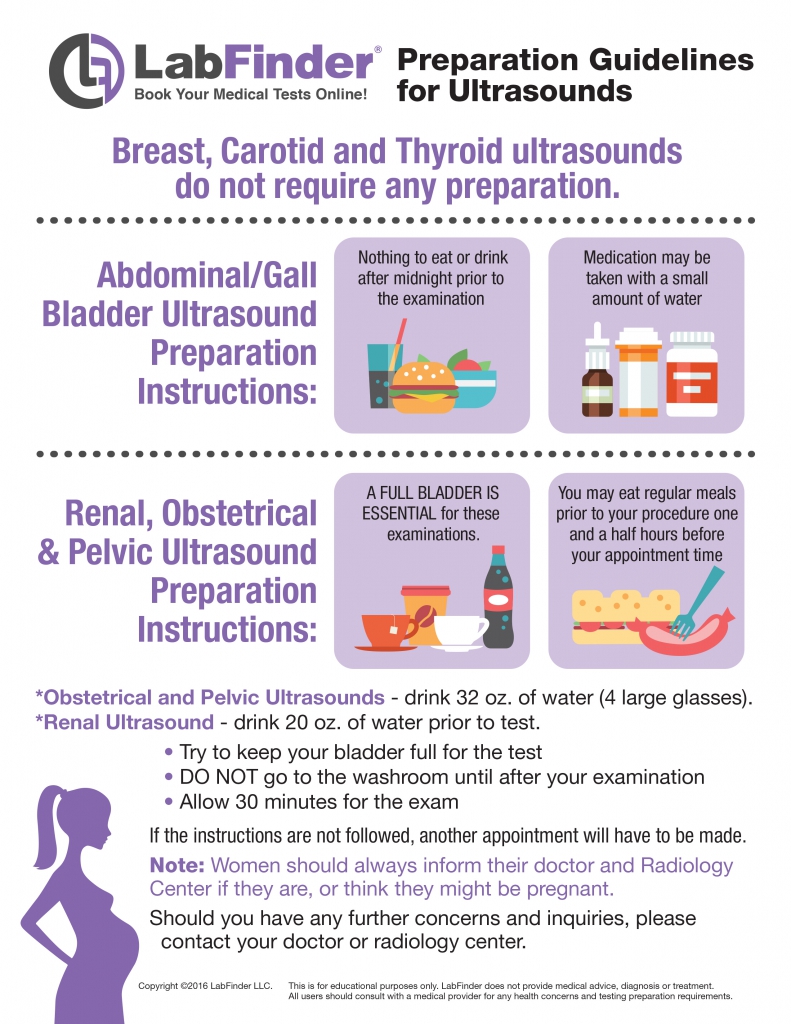What is a Thyroid Ultrasound (Sonogram)?
A Thyroid Ultrasound, also known as a Thyroid Sonogram, is a non-invasive diagnostic imaging procedure that uses high-frequency sound waves to create detailed images of the thyroid gland. The thyroid is a butterfly-shaped gland located at the base of your neck, responsible for producing hormones that regulate metabolism, growth, and development. This ultrasound helps healthcare providers assess the size, shape, and structure of the thyroid, detect nodules or cysts, and evaluate any abnormalities that may indicate conditions such as thyroid cancer, hypothyroidism, hyperthyroidism, or thyroiditis. The procedure is safe, painless, and does not involve radiation, making it an essential tool for thyroid health assessment and management.
Who Can Take the Thyroid Ultrasound (Sonogram)?
A Thyroid Ultrasound is recommended for individuals who:
- Have Detected Thyroid Nodules: Small lumps or growths on the thyroid gland that need further evaluation.
- Are Experiencing Symptoms of Thyroid Disorders: Such as unexplained weight changes, fatigue, palpitations, or changes in heart rate.
- Have a Family History of Thyroid Disease: Increasing the risk of hereditary thyroid conditions.
- Are Preparing for Thyroid Surgery: To provide detailed imaging for surgical planning.
- Have Abnormal Blood Tests: Such as elevated or decreased thyroid hormone levels indicating potential thyroid dysfunction.
- Are Pregnant: To monitor thyroid health, which is crucial for fetal development.
- Have Undocumented Medical Records: To establish a comprehensive baseline for future comparisons and evaluations.
- Are Undergoing Radiation Therapy: For head or neck cancers, which can affect thyroid function.
- Have Symptoms of Thyroid Cancer: Such as a persistent lump in the neck, difficulty swallowing, or hoarseness.
- Are Experiencing Neck Pain or Swelling: Which may be related to thyroid issues.
- Have Recurrent Goiters: Enlarged thyroid glands that may require monitoring.
- Are Monitoring Existing Thyroid Conditions: To track changes and guide treatment plans.
When Can the Thyroid Ultrasound (Sonogram) Be Performed?
The timing for a Thyroid Ultrasound depends on various factors, including symptoms, medical history, and specific health concerns:
- When Symptoms Arise: Such as neck swelling, difficulty swallowing, or unexplained weight changes.
- During Routine Health Check-ups: For individuals with risk factors for thyroid disease.
- Before and After Thyroid Treatments: To assess the effectiveness of medications or surgeries.
- When Diagnosing Specific Conditions: Such as thyroid nodules, goiters, or thyroid cancer.
- During Pregnancy: To monitor thyroid function, which is vital for both maternal and fetal health.
- After Radiation Exposure: To evaluate potential impacts on thyroid health.
- For High-Risk Individuals: Such as those with a family history of thyroid disorders or autoimmune diseases.
- When Other Diagnostic Tests are Inconclusive: To obtain clearer images and a more accurate diagnosis.
- For Preoperative Planning: To provide detailed anatomical information before thyroid surgery.
- When Monitoring Chronic Conditions: Like Hashimoto's thyroiditis or Graves' disease, to manage and adjust treatment plans effectively.
Procedure and Duration
The Thyroid Ultrasound (Sonogram) procedure is quick, painless, and typically completed within a short timeframe:
- Preparation: No special preparation is usually required. However, inform your healthcare provider about any medications you are taking or any allergies you have, especially to gel or lubricants.
- Positioning: You will be asked to lie down on an examination table, usually in a supine position with your neck slightly extended. A water-based gel will be applied to your neck to facilitate the transmission of sound waves.
- The Scan: A handheld device called a transducer will be moved over your neck area. The transducer emits sound waves that bounce off your thyroid and surrounding tissues, creating real-time images on a monitor.
- Duration: The entire procedure typically takes between 15 to 30 minutes, depending on the complexity of the examination and the specific requirements.
- Post-Scan: You can resume normal activities immediately after the scan. There are no restrictions unless advised by your healthcare provider.
Related Conditions or Illnesses
A Thyroid Ultrasound helps diagnose and monitor several thyroid-related conditions, including:
- Thyroid Nodules: Small lumps on the thyroid gland that may be benign or malignant.
- Goiter: Enlargement of the thyroid gland, which can cause neck swelling and discomfort.
- Thyroid Cancer: Detects tumors or abnormal growths that may indicate cancerous changes.
- Hashimoto's Thyroiditis: An autoimmune disorder causing chronic inflammation and hypothyroidism.
- Graves' Disease: An autoimmune disorder leading to hyperthyroidism and overactive thyroid function.
- Thyroid Cysts: Fluid-filled sacs within the thyroid gland.
- Thyroiditis: Inflammation of the thyroid gland due to various causes.
- Multinodular Goiter: An enlarged thyroid with multiple nodules.
- Thyroid Function Abnormalities: Assessing structural causes of hypo- or hyperthyroidism.
- Postoperative Monitoring: Evaluating the thyroid area after surgery to ensure proper healing and detect any complications.
- Congenital Thyroid Abnormalities: Structural defects present from birth affecting thyroid function.
- Thyroid Hemangioma: A benign vascular tumor within the thyroid gland.
- Thyroid Hyperplasia: Enlargement of the thyroid cells leading to gland enlargement.
Risks
The Thyroid Ultrasound (Sonogram) is considered very safe, with minimal risks involved:
- No Radiation Exposure: Unlike X-rays or CT scans, ultrasounds do not use ionizing radiation, making them safe for repeated use and suitable for pregnant women.
- Minor Discomfort: The application of gel and the movement of the transducer may cause slight discomfort, especially if you have sensitive skin or neck muscles.
- Allergic Reactions: Extremely rare, but some individuals may be allergic to the gel used during the ultrasound.
- False Positives/Negatives: Inaccurate interpretations can occur due to overlapping structures, poor image quality, or operator error, potentially leading to unnecessary additional testing or missed diagnoses.
- Emotional Impact: Discovering abnormalities can cause anxiety or stress, even if they turn out to be benign.
Preparations
Preparing for a Thyroid Ultrasound involves a few simple steps to ensure accurate results and a comfortable experience:
- Wear Comfortable Clothing: Choose loose-fitting clothes that allow easy access to your neck area.
- Remove Metal Objects: Take off jewelry, necklaces, and any metal accessories that could interfere with the imaging.
- Inform Your Provider: Let your healthcare provider know if you have any thyroid medications, implants, or have had recent thyroid surgery.
- Avoid Eating or Drinking if Instructed: Although not typically required, follow any specific instructions provided by your healthcare provider.
- Stay Relaxed and Still: Try to remain calm and still during the procedure to ensure clear and accurate images.
- Bring Previous Imaging Results: If you have had prior ultrasounds or other thyroid imaging tests, bring the results for comparison.
- Follow Specific Instructions: Adhere to any additional guidelines provided by your healthcare provider or the imaging center.
Other Similar Tests
There are several other tests related to diagnosing thyroid conditions and assessing overall thyroid health:
- Thyroid Function Blood Tests: Measures levels of thyroid hormones (T3, T4) and thyroid-stimulating hormone (TSH) to assess thyroid function.
- Fine-Needle Aspiration (FNA) Biopsy: Involves taking a small sample of thyroid tissue from a nodule for laboratory analysis to determine if it is benign or malignant.
- Radioactive Iodine Uptake Test: Assesses how well the thyroid gland takes up iodine, which is essential for hormone production.
- Thyroid Scan: Uses radioactive iodine or technetium to create images of the thyroid gland's structure and function.
- CT Scan or MRI: Provides detailed cross-sectional images of the thyroid and surrounding structures, useful for complex cases.
- Palpation: A physical examination technique where a healthcare provider feels the thyroid gland for abnormalities.
- Ultrasound Elastography: An advanced ultrasound technique that measures tissue stiffness to help differentiate between benign and malignant nodules.
- Thyroid Antibody Tests: Detects antibodies associated with autoimmune thyroid diseases like Hashimoto's thyroiditis or Graves' disease.
- Thyroid Panel: A comprehensive set of blood tests that evaluate overall thyroid health and function.
- Whole-Body Scan: Used in thyroid cancer management to detect metastasis or recurrence.
How Accurate is the Thyroid Ultrasound (Sonogram)?
A Thyroid Ultrasound (Sonogram) is highly accurate in providing detailed images of the thyroid gland and detecting abnormalities such as nodules, cysts, and structural changes. The accuracy depends on several factors, including the quality of the ultrasound equipment, the skill and experience of the technician, and proper patient positioning. Modern high-resolution ultrasound machines offer superior image clarity, enhancing the ability to detect even small nodules or subtle structural changes. However, certain factors like excessive thyroid tissue, cystic changes, or operator inexperience can affect image quality and diagnostic accuracy. When combined with other diagnostic tests, such as blood tests and biopsies, thyroid ultrasounds provide a comprehensive assessment of thyroid health. It is essential to have the ultrasound interpreted by a qualified radiologist or endocrinologist to ensure accurate diagnosis and appropriate treatment planning.
What Should I Do If I Find Something Concerning on a Thyroid Ultrasound (Sonogram)?
If your Thyroid Ultrasound results indicate any abnormalities, here's what you should do next:
- Consult Your Endocrinologist or Healthcare Provider: Discuss the findings in detail to understand their implications and determine the necessary next steps.
- Schedule Follow-Up Tests: Additional imaging or diagnostic procedures, such as fine-needle aspiration (FNA) biopsies, thyroid function tests, or radioactive iodine uptake tests, may be required to confirm and further investigate the findings.
- Consider Specialist Referrals: Depending on the abnormality, you may need to consult with an oncologist, thyroid surgeon, or other specialists for further evaluation and treatment.
- Develop a Treatment Plan: Work with your healthcare provider to create a plan to address the identified condition, which may include medication, surgery, or other therapies.
- Adhere to Medication Regimens: If prescribed, take all medications as directed to manage thyroid conditions effectively.
- Implement Lifestyle Modifications: Adopt recommended changes such as improving your diet, increasing physical activity, and managing stress to support thyroid health.
- Monitor Symptoms: Keep track of any new or worsening symptoms and report them to your healthcare provider promptly.
- Seek Support: Reach out to support groups, counseling services, or trusted individuals if you're dealing with significant health changes or emotional stress related to the findings.
- Maintain Regular Check-Ups: Schedule and attend regular medical appointments to monitor your condition and adjust treatment plans as necessary.
- Address Underlying Causes: Work with your healthcare provider to identify and treat any underlying causes contributing to abnormal thyroid ultrasound results.
Book Thyroid Ultrasound (Sonogram) Using LabFinder
Booking your Thyroid Ultrasound (Sonogram) is now easier than ever with LabFinder. LabFinder allows you to locate participating labs and imaging centers near you, ensuring prompt and reliable service. Many of these facilities accept insurance, making the process hassle-free. So, if you're looking for a "thyroid ultrasound near me," or "thyroid sonogram near me," you've come to the right place. Schedule your Thyroid Ultrasound online and save time by avoiding long waits or multiple phone calls.
Conclusion
A Thyroid Ultrasound (Sonogram) is an essential diagnostic tool for assessing and managing thyroid health. By providing detailed and accurate images of the thyroid gland and surrounding structures, it aids in the early detection and precise diagnosis of a wide range of thyroid conditions, from benign nodules to thyroid cancer. Understanding what the test entails, who should take it, and the procedures involved empowers you to make informed decisions about your thyroid health and overall well-being. Whether you're experiencing symptoms, undergoing routine screenings, or preparing for thyroid surgery, a Thyroid Ultrasound offers the clarity and precision needed for effective diagnosis and successful treatment outcomes. Don’t wait—book your Thyroid Ultrasound (Sonogram) near you with LabFinder today and take proactive steps toward maintaining your thyroid and overall health journey.


